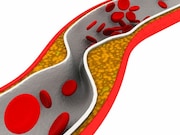Fragmented sleep linked to higher prevalence of multiple affected noncoronary territiories
MONDAY, Jan. 14, 2019 (HealthDay News) — Sleep duration less than six hours and fragmented sleep are associated with atherosclerosis, according to a study published online Jan. 14 in the Journal of the American College of Cardiology.
Fernando Domínguez, M.D., Ph.D., from Centro Nacional de Investigaciones Cardiovasculares Carlos III in Madrid, and colleagues performed seven-day actigraphic recording in 3,974 participants from the Progression of Early Subclinical Atherosclerosis study. Participants were categorized according to sleep duration: less than six hours (very short), six to seven hours (short), seven to eight hours (reference), and more than eight hours (long). The sum of the movement index and fragmentation index was used to define the sleep fragmentation index.
The researchers found an independent association for very short sleep duration with a higher atherosclerotic burden with three-dimensional vascular ultrasound compared with the reference group (odds ratio, 1.27) after adjustment for conventional risk factors. The prevalence of multiple affected noncoronary territories was increased for participants within the highest quintile of sleep fragmentation (odds ratio, 1.34). In the different sleep groups, there were no differences regarding coronary artery calcification score.
“Sleep is an important factor influencing cardiovascular health and could have a role as a marker of subclinical atherosclerosis,” the authors write. “These results highlight the importance of healthy sleep habits for the prevention of cardiovascular disease.”
One author disclosed financial ties to the pharmaceutical industry.
Abstract/Full Text (subscription or payment may be required)
Editorial (subscription or payment may be required)
Copyright © 2019 HealthDay. All rights reserved.








